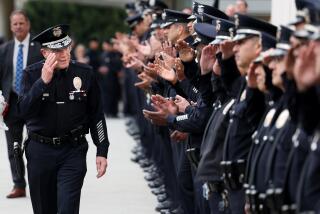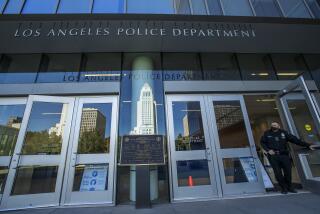Officers’ Tears for a Fallen Comrade
- Share via
I have a daughter who worked for the Hayward Police Department at the time a young officer was shot to death. She was in tears for weeks.
Her name is Cindy. She was executive secretary to the chief and didn’t really know the patrolman who was killed by a felon’s bullet, but her grief was real.
It persisted long after the officer’s funeral was over and ultimately caused her to resign from the department. She’s never gone back to police work.
When I asked why she was so broken up by the death of someone she didn’t know, she replied in words I’ve puzzled over ever since.
She said, “It didn’t matter that I didn’t know him. We were related.”
I thought about this Tuesday as I watched the funeral procession for L.A. County Sheriff’s Deputy Jake Kuredjian. I counted about 400 patrol cars in the procession, and by one estimate there were thousands of officers from throughout the state at his funeral.
Quite obviously, they all couldn’t have known Kuredjian, but the sorrow of those who were, in effect, strangers emerged from a deep well of emotion, of that I have little doubt. A brother had fallen, and they were grieving for him.
*
I write today of a policeman’s funeral to respond to e-mails and phone calls I have received asking why when a cop is killed in the line of duty, thousands of his or her fellow officers attend, but when one of them kills an innocent civilian, there’s not a cop in sight.
One e-mailer wrote, “The Police Department and the politicians ... fail to show equal respect when an innocent citizen is killed ... especially when it is through the incompetence of the police.”
This isn’t the first time I’ve heard those sentiments expressed. I’ve felt the same way myself occasionally and written words similar to those offered by the e-mailers. The answer is in some ways complicated, in other ways simple. It’s the old us-and-them syndrome. Police officers share not only a common uniform, but a common peril. Danger binds them together. They seek comfort and safety in numbers.
Nothing binds the rest of us. We wear no uniforms nor share a common peril. We’re bus drivers, store clerks, factory workers and journalists. If one of us is gunned down by a cop, through either brutality or incompetence, the officer who did it may know pain, but the rest of them aren’t about to form a blocks-long funeral procession.
And you can bet a year’s salary that there won’t be a politician anywhere within a hundred miles. Just us and Johnnie Cochran.
The reason is, to reverse my daughter’s logic, policemen aren’t related to us. There is no kinship anymore between us and the cop on the beat. I say anymore because I think that once there might have been. One wonders, what happened?
Have we become more disdainful of them or they of us? When did we become enemies instead of relatives? When did we stop trusting each other? When did we become afraid of each other?
Like two ships caught in conflicting currents, we seem to be drifting slowly in opposite directions, and the gap is growing steadily wider.
*
I think that the ever-increasing number of policemen who attend a brother officer’s funeral indicates a growing need for dependency in a society that has become more hostile through the years.
While the grief may be real, the assemblage is also like one of those old military parades where a nation can publicly showcase its strength as a kind of warning to those who might entertain notions of conquest. The officers at Jake Kuredjian’s funeral wanted us to know that they were one, they were related.
E-mailers and phone-callers regarded the ritual as extreme, but I don’t. I understand the sins of the cops, and I understand the obvious dichotomy between a policeman’s showy send-off and the lonely funeral of a policeman’s victim. Blame the system. Blame the culture. Blame the tensions that divide us.
We’re not related in the sense my daughter was talking about, and that’s too bad. While you and I can never know a cop’s peril and may never experience the terrible need of a split-second, life-and-death decision, we do share a common humanity. We are, in the unique connections of goals and dreams, one family.
If the ritual for Jake Kuredjian seemed excessive, it’s the nature of a family to weep over the death of a deeply loved son. In the larger human family sense, it’s our loss too. He was one of us.
*
Al Martinez’s column appears Mondays and Thursdays. He can be reached at al.martinez@latimes.com.
More to Read
Sign up for Essential California
The most important California stories and recommendations in your inbox every morning.
You may occasionally receive promotional content from the Los Angeles Times.













